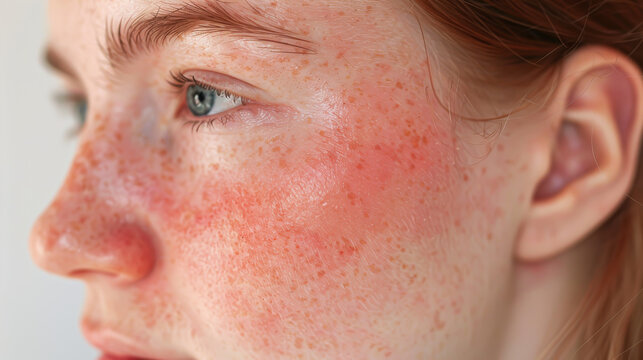Living with a chronic illness can be challenging enough on its own, but when combined with another condition like rosacea, it adds an extra layer of complexity to daily life. Rosacea is a chronic skin disorder that primarily affects the face, leading to redness, visible blood vessels, and sometimes pus-filled bumps. It’s not life-threatening, but its impact on self-esteem and social interactions can be significant. When managing multiple conditions, including rosacea, a holistic and well-coordinated approach is essential for maintaining overall health and well-being.
In this article, we’ll explore the relationship between Rosacea Treatment in Dubai and chronic illnesses, the challenges of managing multiple conditions, and practical strategies for living a balanced life.
Understanding Rosacea
Rosacea is often mistaken for acne or allergic reactions, but it’s a distinct skin disorder characterized by:
- Facial redness: Persistent redness, often around the nose and cheeks.
- Visible blood vessels: Broken capillaries that become more prominent over time.
- Swelling or thickened skin: Especially in severe cases, the skin may thicken, leading to a condition known as rhinophyma, which primarily affects the nose.
- Bumps or pimples: These are not typical acne pimples but can resemble them.
- Eye irritation: Many people with rosacea experience burning, stinging, or red eyes.
Rosacea symptoms can flare up due to triggers like sun exposure, spicy foods, alcohol, stress, and even certain skincare products. While the exact cause of rosacea remains unclear, it’s believed to be a combination of genetic, environmental, and immune factors.

Chronic Illness and Rosacea
Chronic illnesses, such as autoimmune diseases, cardiovascular conditions, diabetes, and others, require ongoing care and management. For individuals who already have a chronic illness, the addition of rosacea can feel overwhelming, as it demands extra attention and can exacerbate feelings of frustration.
The skin and immune system are closely linked, and some chronic illnesses may trigger or worsen skin conditions like rosacea. For instance, autoimmune diseases such as lupus and rheumatoid arthritis are known to increase inflammation in the body, which can aggravate skin issues.
Stress and Its Role in Multiple Conditions
One of the most common triggers for rosacea is stress—a factor that’s also known to worsen symptoms of other chronic conditions. Managing multiple health concerns often brings heightened stress levels, which in turn can lead to flare-ups of both rosacea and the underlying chronic illness. This cyclical effect underscores the importance of effective stress management techniques.
The Challenges of Managing Multiple Conditions
When dealing with rosacea and another chronic illness, the challenges are both physical and emotional. Here are some of the common hurdles faced by individuals:
1. Treatment Conflicts
For people managing two or more conditions, treatment plans can sometimes conflict. Certain medications used for chronic illnesses may exacerbate rosacea. For example, corticosteroids, often prescribed for inflammatory conditions, can lead to steroid-induced rosacea. Similarly, some heart medications may trigger skin flare-ups. It’s essential to work closely with healthcare providers to ensure that treatments for one condition don’t worsen another.
2. Mental and Emotional Toll
The emotional impact of living with a chronic illness is well-documented, but adding a visible skin condition like rosacea can amplify feelings of anxiety, depression, and social withdrawal. Many individuals with rosacea report feeling self-conscious about their appearance, which can affect their quality of life.
3. Multiple Appointments and Treatments
Managing multiple conditions often means frequent doctor visits, medications, and lifestyle adjustments. This can be physically and mentally exhausting. Individuals may feel like they are constantly navigating healthcare systems, balancing medications, and making dietary changes to avoid flare-ups.
Managing Rosacea and Chronic Illness: A Holistic Approach
While managing rosacea alongside a chronic illness can be challenging, a comprehensive approach can make a significant difference in overall health and quality of life.
1. Work with a Multidisciplinary Team
It’s essential to have a healthcare team that understands both your chronic illness and your rosacea. Dermatologists, primary care physicians, and specialists should communicate and collaborate to create a treatment plan that addresses both conditions. Coordination is key to avoiding conflicting treatments and ensuring that your overall health is the priority.
2. Identify Triggers and Make Adjustments
Since both chronic illnesses and rosacea can be influenced by lifestyle factors, it’s crucial to identify specific triggers for each condition. Keep a health journal to track food, stress levels, skincare products, and any changes in symptoms. Over time, this can help identify patterns and reduce the frequency of flare-ups.
3. Prioritize Skincare
Proper skincare is essential for managing rosacea, especially when dealing with other health conditions. Use gentle, fragrance-free products that are specifically designed for sensitive skin. Avoid harsh exfoliants or products with alcohol, which can worsen redness. Sunscreen is critical for preventing further skin damage and irritation, so choose a broad-spectrum SPF 30 or higher that’s formulated for sensitive skin.
4. Dietary Considerations
Some chronic illnesses, such as diabetes or autoimmune disorders, require specific dietary adjustments. Certain foods that are beneficial for one condition may not be ideal for rosacea. For instance, spicy foods and alcohol are common rosacea triggers, but some autoimmune diets may encourage their consumption in moderation. Consulting with both a dietitian and your healthcare provider is essential to create a meal plan that accommodates all of your health needs.
5. Stress Management
Given the role of stress in both rosacea and many chronic illnesses, finding ways to manage stress is crucial. Techniques like mindfulness, meditation, deep breathing exercises, and yoga can help reduce stress levels and promote better health. Regular physical activity, even gentle exercises like walking or swimming, can help manage stress, improve mood, and benefit both skin and overall health.
6. Consider Alternative Therapies
For some individuals, complementary therapies like acupuncture, herbal supplements, or probiotics may offer additional relief. However, always consult with your healthcare provider before introducing new treatments, especially if you are already managing multiple conditions.
7. Stay Connected
Living with multiple health issues can sometimes feel isolating, but support is available. Online communities, local support groups, or therapy can provide emotional support and help you connect with others facing similar challenges. Talking to others who understand what you’re going through can reduce feelings of loneliness and stress.
Conclusion
Managing rosacea alongside a chronic illness can be difficult, but it’s entirely possible with the right approach. By working with healthcare professionals, identifying triggers, practicing self-care, and managing stress, individuals can reduce symptoms and improve their quality of life. Taking a proactive and holistic approach allows you to address both conditions effectively and achieve better overall health.






Comments